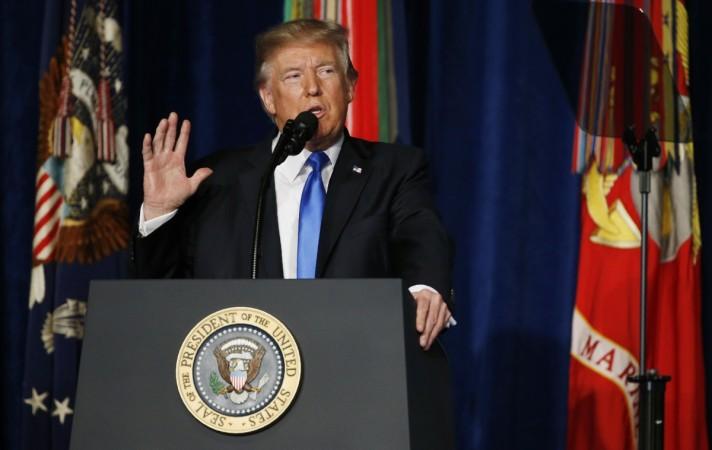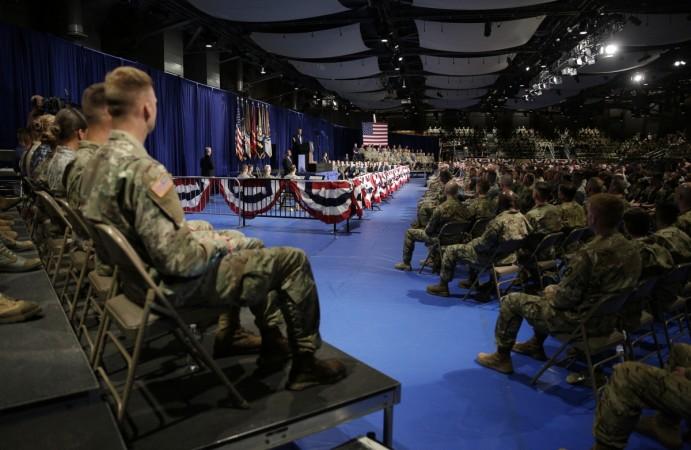
United States President Donald Trump has unveiled his new policy on Afghanistan saying that he would stop the resurgence of safe havens for terrorists in the country and also sought for more "help" from India, especially in the "economic sector".
Trump also called for an urgent need for Pakistan to show its true commitment to its fight against terrorism. He said that Pakistan provides "safe havens to agents of chaos, violence and terror" and that the US "can no longer be silent" about it.
"Pakistani people have suffered from terror, but at the same time, Pakistan has been a safe haven for terrorists. We can no longer be silent about Pakistan's safe havens to terrorist organisations," the US president said adding that the country houses "20 US designated foreign terrorist organisations."
Trump made the statement while addressing the nation about his administration's plans to increase the presence of the US military in Afghanistan to deal with the influence of the Taliban and the Isis affiliate groups in the country.
"Pakistan has much to gain from partnering with our effort in Afghanistan. It has much to lose by continuing to harbour terrorists. A core pillar of our new strategy in Afghanistan is a shift from a time-based approach to one based on conditions," Trump said on Tuesday.
On partnering with India, Trump said: "We will develop a deeper strategic partnership with India, but we want them to help us more in Afghanistan, especially in the economic sector... India makes billions of dollars with the US in trade; want them to work with us with more economic assistance in Afghanistan."
No 'blank check' for US presence in Afghanistan

President Trump, however, said that the US presence in Afghanistan is "not a blank check" for the country. He also called for a deepened involvement of the US in a military mission that has for long plagued his predecessors and that he had, himself, once called a "complete waste".
"The government of Afghanistan must carry their share of the military, political, and economic burden. The American people expect to see real reforms, real progress, and real results. Our patience is not unlimited."
However, the US president did not specifically talk about any strategy to resolve an almost 16-year-old conflict in Afghanistan. He did not even specify the number of troops that would be sent to the country nor did he talk about the conditions on the basis of which he would ascertain the success of the military mission in the war-torn country.
"We will not talk about numbers of troops or our plans for further military activities... America's enemies must never know our plans or believe they can wait us out... I will not say when we are going to attack, but attack we will," Trump said.
Trump only mentioned that his strategy to fight against terrorism in Afghanistan would be a comprehensive approach that would aim for a political solution and which would not be based on a timeline like it was under the Obama administration. It would be a conditions-based regional approach.
Original instinct was to pull out troops: Trump

Trump argued against a hasty withdrawal of US troops from Afghanistan as the "consequences of a rapid exit are both predictable and unacceptable. A hasty withdrawal would create a vacuum for terrorists, including ISIS and Al Qaeda, where they would instantly fill just as happened before September 11."
"My original instinct was to pull out, and historically I like following my instincts. But all my life, I've heard that decisions are much different when you sit behind the desk in the Oval Office — in other words when you're president of the United States. So I studied Afghanistan in great detail and from every conceivable angle," the US president said.
He added that his national security advisers convinced him to strengthen the ability of the US to prevent the Taliban and other terrorist organisations from ousting the US-backed government in Afghanistan. He will have meetings with military advisers and his national security team at Camp David on Saturday.
Around 8,400 troops are currently stationed in Afghanistan with about 2,000 of them engaged involved in counter-terrorism operations against al-Qaeda and Isis-Khorasan, the group's affiliate in the country. Top US military officials are of the view that 4,000 additional soldiers be sent to the country as part of a broader revamp of regional strategy, ABC News reported.

In 2017, 11 US service members have been killed in Afghanistan while over 2,250 Americans have lost their lives in the country since 2001.
'Open to political agreement with Taliban'
Trump also said that he was open to a possible political agreement with the Taliban in Afghanistan.
"Someday, after an effective military effort, perhaps it will be possible to have a political sentiment that includes elements of the Taliban in Afghanistan," he said adding that "nobody knows if or when that will ever happen."
Trump vowed that "America will continue its support for the Afghan government and military as they confront the Taliban in the field."
'Afghanistan is a complete waste'

Trump's new strategy to fight against terrorism in Afghanistan is a sharp contrast to his position, as a private citizen, on US' involvement in the war-torn country.
In 2012, he had posted several tweets saying that the US' involvement in the Afghanistan has "wasted an enormous amount of blood and treasure" and that it was time for the troops to "come home".
Why are we continuing to train these Afghanis who then shoot our soldiers in the back? Afghanistan is a complete waste. Time to come home!
— Donald J. Trump (@realDonaldTrump) August 21, 2012
We have wasted an enormous amount of blood and treasure in Afghanistan. Their government has zero appreciation. Let's get out! — Donald J. Trump (@realDonaldTrump) November 21, 2013
How many more of our soldiers have to be shot by the Afghanis they are training? Let's get the hell out of there and focus on U.S.
— Donald J. Trump (@realDonaldTrump) October 2, 2012

















